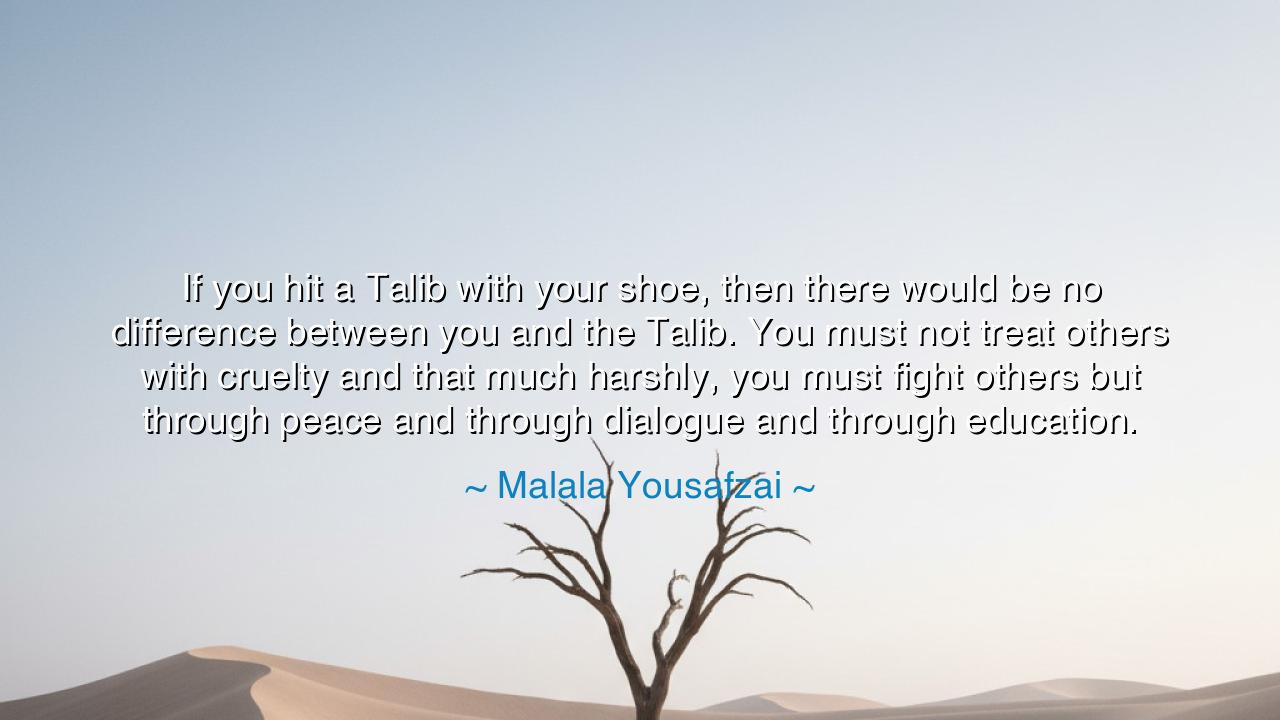
If you hit a Talib with your shoe, then there would be no
If you hit a Talib with your shoe, then there would be no difference between you and the Talib. You must not treat others with cruelty and that much harshly, you must fight others but through peace and through dialogue and through education.






The young sage of our time, Malala Yousafzai, whose courage has become a light for generations, once spoke these words of immortal wisdom: “If you hit a Talib with your shoe, then there would be no difference between you and the Talib. You must not treat others with cruelty and that much harshly, you must fight others but through peace, and through dialogue, and through education.” In this simple utterance, born not from a throne but from suffering, she revealed the eternal law of humanity—that vengeance cannot heal, and that the fire of hate can only be quenched by the waters of understanding. Her words are not the soft counsel of fear, but the mighty roar of a soul who has seen the darkness and still chosen the light.
To understand her message, one must know the soil from which it grew. Malala, a girl of the Swat Valley in Pakistan, lived under the shadow of the Taliban, who sought to silence the voices of women and extinguish the flame of learning. When she was but a child, she defied their threats and spoke for the right of girls to go to school. For that defiance, they struck her down with a bullet to the head. Yet from her hospital bed, she rose not with bitterness, but with mercy. When asked if she hated her attackers, she said no—that hatred would make her like them. Thus were born the words of her quote: a creed that stands above revenge, a call to battle not with fists, but with truth.
In her teaching lies a paradox both ancient and divine: that the greatest strength is found in forgiveness, and the truest victory in compassion. The one who returns hate for hate multiplies the shadow; the one who meets cruelty with peace disarms it. This wisdom is as old as civilization itself. The Buddha spoke it when he said, “Hatred does not cease by hatred, but only by love.” Christ echoed it upon the cross, praying for his persecutors. Gandhi, too, lived it when he faced the might of empire with the stillness of non-violence. And now, in the modern age, Malala—a child of war and courage—has carried that same torch into the hearts of a new generation.
Let us recall a story from the life of Nelson Mandela, who, after twenty-seven years of imprisonment, emerged not seeking retribution, but reconciliation. His oppressors had chained his body, but never his spirit. He knew that vengeance would enslave his people anew, binding them to the same hatred that had once bound him. And so he forgave, he spoke, he rebuilt. Like Malala, he understood that to respond with cruelty is to become what one hates; to answer injustice with education, dialogue, and peace is to rise above it. These are not the weapons of the weak, but the armory of the truly powerful—the weapons that change not just nations, but the soul of humankind.
Malala’s words, though born in her personal struggle, speak to all battles within the human heart. Every person, in their life, will encounter cruelty, misunderstanding, or harm. The impulse to strike back, to wound as one has been wounded, is ancient and natural. Yet Malala’s voice reminds us that this impulse is the beginning of our descent. To fight through education is to rise—to turn conflict into enlightenment, pain into purpose. To fight through dialogue is to confront not the person, but the ignorance within them. To fight through peace is to build a world in which no more children must take up such battles.
Her teaching does not deny the need for strength; rather, it redefines it. True strength, she shows us, is not the ability to destroy, but the will to endure without surrendering one’s humanity. The warrior of peace is not weak; she is unbreakable, for her weapon is wisdom, and her shield is love. The Talib, in Malala’s metaphor, stands for every form of hatred that seeks to dominate through fear. To strike it with violence is to mirror it; to strike it with learning is to transcend it. Knowledge, compassion, and truth—these are the tools that disarm evil without becoming it.
The lesson for all who hear her words is clear: do not become what you oppose. When injustice strikes, respond not with rage, but with reason. When cruelty rises, let your answer be courage wrapped in kindness. Build schools where others build prisons; speak where others shout; forgive where others condemn. Each act of understanding is a victory greater than any won by force.
Thus, Malala’s words shall echo through the ages—not as the cry of a victim, but as the proclamation of a prophet of peace. She teaches us that the true revolution begins not in anger, but in empathy; not in destruction, but in creation. So let us remember: if we wish to change the world, we must not fight like our enemies—we must teach, we must love, we must rise. For the sword of education cuts deeper than any weapon, and its victory endures forever.






AAdministratorAdministrator
Welcome, honored guests. Please leave a comment, we will respond soon